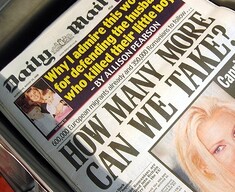Anyone who has picked up a copy of The Daily Mail or The Daily Express will probably be familiar with the modern media portrayal of immigrants coming here in their thousands to take our jobs, homes and benefits. But these negative stereotypes of new arrivals are nothing new and were in fact just as common in press reports from over a century ago.
The targets back then were Jewish refugees fleeing persecution in Tsarist Russia at the end of the nineteenth century.
In 1904, The Sun wrote of ‘criminals, undesirables and radicals’ who were ‘flocking to England in their thousands’ to ‘fill our hospitals, our asylums and prisons and the taxpayer has to support them and smile’
It was working class East London that hosted most of these refugees and initially it was the London newspapers of the time voicing disapproval, using terms such as “aliens” and “undesirables” to describe newcomers. The Evening News ran stories almost daily during the summer of 1891, using headlines such as “Jewish Invasion” and “Keep The Aliens Out”. Others such as the Eastern Post and the East London Observer soon jumped aboard, reporting of “foreign floods” crowding locals out of homes and jobs and lowering wages. As with today’s stories, there was little evidence to support such claims.
It is estimated that around 150,000 refugees settled between 1880 and 1905, with many who came moving onto America. However, inaccurate statistics were published regularly. Reports of influxes of as many as 800,000 led to outraged readers’ letters. Arrivals found themselves accused of spreading everything from cholera to anarchism.
When popular national tabloids started to appear in the 1890s things intensified further. In 1904, The Sun* wrote of “criminals, undesirables and radicals” who were “flocking to England in their thousands” to “fill our hospitals, our asylums and prisons and the taxpayer has to support them and smile”.
The Express called immigrants a “menacing evil” while in June 1904 The Mirror claimed “with almost every tide of the Thames a deposit of the floating wreckage of the continent is being left on our shores”.
The Mail, meanwhile - who only a few years back published 200 anti-asylum articles in one year - wrote a piece in February 1900 entitled “So-Called Refugees” about a boat bringing 600 refugees to Southampton. “There were scarcely a hundred of them that had, by right, deserved such help” it reported, “and these were the Englishmen of the party. The rest were Jews”.
Reports in the broadsheets were only slightly more sober. The Times and The Observer did publish pieces recognising the benefits immigration had brought to Britain and voicing concerns about heightened prejudice, but even they published inaccurate statistics and supported harsh restrictive measures.
Like today, these newspapers at the time stated they weren’t being racist. Most sought to emphasise distinction between “respectable” English Jews and the “alien pauper community” of Russian and Polish Jews. But anti-Jewish sentiment increased at the time, with over 40,000 joining the nationalist British Brothers League.
"In the period leading up to Britain’s first piece of immigration legislation in 1905, anti-immigration reporting in a range of newspapers reached levels of hysteria and frequency matching anything seen today"
The Aliens Act was eventually passed in 1905. It gave authorities the right to remove destitute immigrants and imposed controls against numerous groups seeking entry, including those with mental illness. Media hostility towards Jewish entrants continued right up until the eve of World War Two. The worrying similarity between media coverage then and now suggests that a few newspaper editors could do with some history lessons and a course in responsible journalism.
Source: The New Londoners




